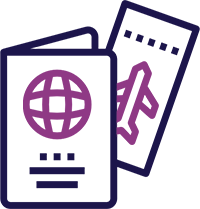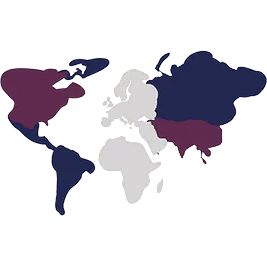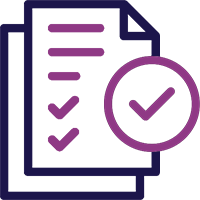Express Entry Canada
Express Entry is an online pathway to skilled workers’ settlement in Canada and manages the immigrants’ applications for permanent residence. The Express Entry system lets you apply for several Canadian immigration programs.
Call us at +1 844 290 6312 for any queries or advice about your situation. Our professional lawyers are here to help in your immigration process.
Request a call back from our immigration experts
Benefits of Choosing IAS’ Canada Immigration Lawyers
When it comes to obtaining a Canada visa or permit, IAS Canada immigration lawyers are well-equipped to help you.
With IAS’ track record of successfully helping clients visit or immigrate to Canada successfully, we can help you achieve your goal.
Our dedicated immigration lawyers provide our services through a comprehensive and personalised approach. With IAS, you enjoy:

Compassionate support from an experienced immigration lawyer dedicated to your success



Support in gathering supporting documents and completing a high-quality application.



Confidence that your case is being handled by an experienced team.



In-house document checks done by lawyers who are well-versed in immigration matters.
Services we Provide
What Is Express Entry in Canada?
Express Entry is an immigration applications manager. It’s an electronic system that controls skilled workers’ applications for permanent residence in Canada. If you’re interested, you can submit your Express Entry profile online.
The Federal government uses this system to determine your eligibility for any of the Express Entry managed programs. It can take up to 6 months for Immigration, Refugees, and Citizenship Canada (IRCC) to process the results of your application.
Suitable federal economic immigration programs under the Express Entry system include the following:
- Federal Skilled Worker Program (FSWP)
- Federal Skilled Trades Program (FSTP)
- Canadian Experience Class (CEC)
The system accepts candidates into the Express Entry pool and ranks them according to the Comprehensive Ranking System (CRS). It calculates the CRS points based on the applicant’s work experience, education, age, and language proficiency, among other factors.
The Express Entry to Canada lets skilled individuals and their families become permanent residents of Canada within a short time.
The first thing you need to do is create an online Express Entry profile. After approximately two weeks, the Canadian government chooses the top-ranking candidates from the Express Entry pool. It then issues ITA for permanent residence to those individuals.


What is a CRS Score?
A CRS (comprehensive ranking system) score is a score that is assigned to each individual applicant in the Express Entry pool that objectively assesses their suitability for economic immigration.
Points are allocated using a wide variety of metrics, including a candidate’s personal information, work experience, family information and suitability for specific immigration streams.
How are Points in the Comprehensive Ranking System Allocated?
CRS points are divided into two sections: core and additional points. The core section is further divided into three categories. Core and additional sections can award a maximum 600 points each, making for a possible maximum score of 1,200 points.
The different sections of the CRS are outlined below:
A: Core/Human Capital Factors
This section awards points based on the following factors, giving a maximum of 460 points (with a spouse or common law partner:
- Your age
- Your highest level of educational qualification
- How proficient you are in English or French
- How much Canadian work experience you have
B: Spouse or Common-Law Partner Factors (If Applicable)
This section awards points based on the following factors, giving a maximum of 500 points:
- Your spouse or common-law partner’s highest level of educational qualification
- How proficient your spouse or common-law partner is in English or French
- How much Canadian work experience your spouse or common-law partner has
C: Skill Transferability Factors
This section awards points based on the following factors, giving a maximum of 100 points:
- Combining your language proficiency with any post-secondary degrees
- Combining any Canadian work experience with any post-secondary degrees
- Combining any relevant foreign work experience with Canadian work experience
- Combining any certificates of qualifications (in trade occupations) with language profiency
D: Additional Points
This section awards points based on the following factors, giving a maximum of 600 points:
- Having a sibling who is a permanent resident or citizens of Canada
- Scoring highly on French or English language skills tests
- Relevant post-secondary education in Canada
- Having an arranged job offer in Canada
- Having provincial or territorial nomination
Canada Express Entry Requirements: Eligibility Criteria for Express Entry
Each of the 3 programs under Canada Express Entry requires you to meet specific conditions to apply. Hence, if you wish to immigrate to Canada, you must select one of them and ensure that you meet all the required conditions.
Federal Skilled Worker Program (FSWP)
If you want to immigrate to Canada under the FSWP, there are specific requirements you need to meet to make it through the Express Entry System. They include the following:
- Skilled work experience in National Occupation Classification (NOC) categories TEER 0, 1, 2, or 3 for at least one continuous year
- Proof of adequate language ability in French or English by taking an approved language test
- Proof of Canadian secondary or post-secondary educational qualifications, or international equivalent
You don’t need a job offer to qualify for the Federal Skilled Worker program in the Express Entry system.
Canadian Experience Class (CEC)
CEC is the other program you can apply for permanent residence in Canada. However, you must comply with the following terms:
- Have a minimum of one year of work experience in the past 3 years, obtained under a valid work permit. The job can be full-time, part-time, or both.
- CLB 7 English Or French proficiency for NOC 0 or A, and CLB 5 for NOC B.
- The skill type must be 0, A, or B under the NOC.
Job offers and educational levels aren’t a consideration in this program.
The Federal Skilled Trades Program (FSTP)
The basic Express Entry requirements for the FSTP application include the following:
- At least 2 years of work experience in the previous 5 years. Your primary occupation must constitute a full-time and part-time job combination or at least two jobs.
- Canadian or foreign skilled trade experience skill type (under NOC B main groups)
- English or French proficiency: CLB 5 (listening and speaking) and CLB 4 (writing and reading).
- A valid full-time job offer for a minimum of 1 year. Alternatively, have a certificate of qualification proving your professionalism in the skilled trade. Federal, territorial, and Canadian authorities are responsible for issuing this certificate.
- Sufficient funds to support you and your family while in Canada.
Education requirements aren’t necessary for Express Entry candidates under this program.
Provincial Nominee Programs (PNP) and Canada Express Entry
Express Entry also allows you to apply to one of the above three programs through the PNP.
The basic requirements for this involve being eligible for one of the above programs and also being eligible for the specific requirements of the province or territory you wish to be nominated by.
How to Create an Online Express Entry Profile: Check Eligibility for Express Entry
The Express Entry profile enables the Canadian government to assess your eligibility as a skilled worker applicant. You can create your online profile by following the steps below:
- Take a language ability test. Have a government-approved English or French proficiency test and add the results to your profile. All the skilled immigration programs demand that the Express Entry candidate be conversant with at least one of Canada’s official languages.
- Assess your foreign education credentials. If you studied outside Canada, have your certificates, diplomas, or degrees assessed to ensure that your credentials are equivalent to Canadian education. Nonetheless, that’s only applicable to the Federal Skilled Worker Program applicants. Even so, it’s advisable to undergo the assessment while applying for the other program, as it can significantly increase your eligibility points.
- Find out your National Occupation Classification (NOC). You must show that your work experience aligns with the occupations defined under Canada’s NOC database. Therefore, ensure that your job lies in Skilled type 0 (Management), Skilled level A (Professional), or Skilled level B (Skilled trade and Technical jobs).
- Determine your Express Entry eligibility. Check your eligibility for the Express Entry System with an online tool found on Immigration, Refugees, and Citizenship Canada’s website.
- Compile your Express Entry profile. Build your profile by providing all the necessary information about your eligibility requirements. The details include contacts, age and identity, educational background, work experience, language ability, adaptability, and family makeup. Additionally, you must include all the relevant supporting documents.
- Submit your complete profile. Confirm that you have all the needed details in place and submit your profile. Consequently, you’ll receive a job-seeker validation code and an Express Entry number.
If you meet the requirements, the Immigration officer places you in the Express Entry pool. The offer will assess you using the Comprehensive Ranking System, and if you pass the minimum score, you receive an ITA as a permanent resident.
Express Entry Rounds of Invitations
Invitations to apply (ITAs) are issued during pre-scheduled invitation rounds.
Each round may target a specific type of candidate or category, such as French-speaking candidates, those who work in specific occupations or only those applying through certain immigration pathways.
IRCC will decide how many candidates they will be inviting to apply and then select the highest-ranking candidates in order to fill this quota. This means that there will often be a cut-off point where candidates with a CRS score lower than a certain threshold will not receive an invitation to apply during that round.
Each round will come with a set of instructions conveying when the round will take place, the number of candidates that will be invited to apply, the round type and eligibility for the round.
How to Apply for Express Entry: Step-by-Step Express Entry Canada Application Guide
After receiving an ITA, it’s time to submit a concrete permanent residence application for your program of choice. You must also upload several documents that support the information you have put in your online account.
Although these documents vary depending on the specific account, here are the common ones you must upload:
- Proof of funds from your money holder such as banks or other financial institutions
- Educational Credential Assessment (ECA) (for non-Canadian education)
- A medical assessment report from a panel physician recognised by IRCC
- Provincial Nominee Certificate (for the PNP application)
- Canadian service International Credential Assessment
- Marriage or Divorce Certificate (where applicable)
- Valid identification documents such as a passport
- Previous employers’ work reference letter
- A valid job offer letter (where necessary)
- Police clearance certificates
- Language test results
The above details cater to all the Express Entry programs except the PNP.
Provincial Nominee Program Application
PNP’s application process differs slightly from the other Federal Express Entry program. Below are the two ways to apply for this program:
- Province/territory option: Contact your province or territory of choice and submit a nomination application. Once accepted, create or update your Express Entry profile by indicating your nomination.
- Express Entry profile route: Create a profile and include the provinces/territories of your interest. You’ll receive a nomination in your Express Entry account once your profile goes through. And you can accept the nomination electronically.
Upon receiving an ITA for the Canadian permanent residence application, you have up to 60 days to submit a PR online application. After the submission, the immigration office ‘locks’ your profile to prevent further updates.
It’s worth noting that you must meet all the admissibility and eligibility requirements according to Canada’s Immigration Law to move to the country.
Express Entry Application Fee: How Much Does Express Entry Cost?
After completing your permanent residence application form and uploading the relevant documents, the system provides a list of the applicable fees. The list’s components include:
- Processing fee: CAN$1,525
- Biometrics fee: CAN$85
- Right of permanent residence fee: CAN$575
Use a debit or credit card to pay fees online. The minimum amount is the processing fee, which comes right after submitting your application.
Also, biometric fee payment comes at this time to prevent delays and includes collecting fingerprints and digital photos charges. You receive a confirmation letter after submitting your application to process your biometrics, which you must present to the presiding officer.
The biometrics presentation must be in person, but you must book an appointment before visiting your nearest collection point.
You must pay using other options if you wish to pay for the ‘Right of Permanent residence’ fee or add a dependent child or spouse.
The Express Entry fee may also include extra fees from the following:
- Language tests
- Education credential assessment
- Police clearance certificates
- Medical examinations
- Provincial immigration fees (where applicable)
Required Documents for Express Entry Canada
You will have to provide a range of documentary evidence in order to support your Express Entry application.
These may include (but not be limited to) the following:
- A valid passport or travel document
- English or French language test results
- Proof of Canadian education or an educational credential assessment report for immigration purposes (if applying through the Federal Skilled Workers Program or you want to get points for the education you got outside Canada)
- Written job offer from an employer in Canada (if you have one)
- Proof of work experience (such as a reference or experience letter from an employer)
- Certificate of qualification in a trade occupation issued by a Canadian province or territory (if you have one)
- Proof that you meet the financial requirements
- Police certificates
- Provincial nomination (if you applied for the Provincial Nominee Program)
After you Apply for Express Entry Canada
After you submit your application, you will need to arrange to give your biometrics information (if you are aged between 14 and 79 years old).
You will need to give your biometrics within 30 days of you receiving the letter indicating this requirement from IRCC.
After you have done this, IRCC will process your application and check that you have paid the fees correctly, included all necessary documents and filled in your application correctly.
IRCC may contact you through your online account to provide updates, reach out if they require more information from you or let you know if there are any further steps you have to take.
The online account will also be where you will receive confirmation that your application has been accepted or refused.
Express Entry Canada Processing Time: How Long Does Express Entry Canada Take?
It takes 6 months for Express Entry Canada. This timeframe is varies by program.
The duration comprises time before receiving an ITA and permanent residency application decision.
Every 2-4 weeks, IRCC conducts a draw from the Express Entry pool. Consequently, high-ranking applicants receive an ITA after a few weeks. If not chosen, your profile remains active in the pool for 1 year, after which you can resubmit your profile.
Your ranking depends on your Express Entry points.
If you sail through the system and get an ITA, you have 60 days to submit your Permanent residence application. For that reason, you should have all your supporting documents ready before your receive the ITA to meet the short timeframe.
Upon your application approval, you get a Confirmation of Permanent Residence (COPR) document. The COPR allows you to apply for a PR card, which you use as your Canadian resident status proof while moving out of Canada.


How Can IAS Help with Your Canada Express Entry Application?
Although the Express Entry system is a reliable immigration pathway to Canada, you might encounter challenges in your application process. Some of these obstacles include the following:
- Lack of understanding of which of the four programs is ideal for you
- No guarantee of receiving an ITA after attaining the system’s threshold
- Failure to meet the minimum points requirement
- Tight application timeframe after receiving the ITA
- And more.
The above issues and many other necessitates your having an immigration expert by your side throughout your journey of moving to Canada.
Our specialised immigration lawyers are conversant with the Canadian Express Entry System and all its programs. They’ll help you move to the country successfully by ensuring you pick the most suitable program and achieve the highest points possible.
Additionally, they’ll walk with you until you obtain a Permanent Residence visa.
For immediate help in your situation, call us at +1 844 290 6312 or contact us online.
Table of Contents
Table of Contents will appear here.Legal Disclaimer
The information provided is for general informational purposes only and does not constitute legal advice. While we make every effort to ensure accuracy, the law may change, and the information may not reflect the most current legal developments. No warranty is given regarding the accuracy or completeness of the information, and we do not accept liability in such cases. We recommend consulting with a qualified lawyer at Immigration Advice Service before making any decisions based on the content provided.
Frequently Asked Questions
The cut-off score for Express Entry varies with each round of invitations sent out, based on the proportion of applicants who have attained high scores.
However, the general expected range may be anything from between 300 and 800, roughly speaking.
As an example, the cut-off score for the 24 April 2024 Express Entry draw was 410.
If you are eligible for more than one program under Express Entry, IIRC will decide which one to issue an invitation to apply under.
If you do not wish to enrol in that program, you can decline the invitation. However, there is no guarantee that you will be offered an invitation in your program of choice later.
The guidance from IIRC states that you are not permitted to have more than one Express Entry profile at a time.
If you have educational qualifications that are not from Canada, you must first get an educational credential assessment (ECA) to verify that your qualification is equal to a Canadian one.
ECAs can be obtained via several designated organisations in Canada.


What our clients are saying
How our UK Immigration Lawyers can help
At the Immigration Advice Service our lawyers specialise in a wide range of UK visas, nationality and asylum applications and have represented clients in various successful complex and high-profile cases.






























